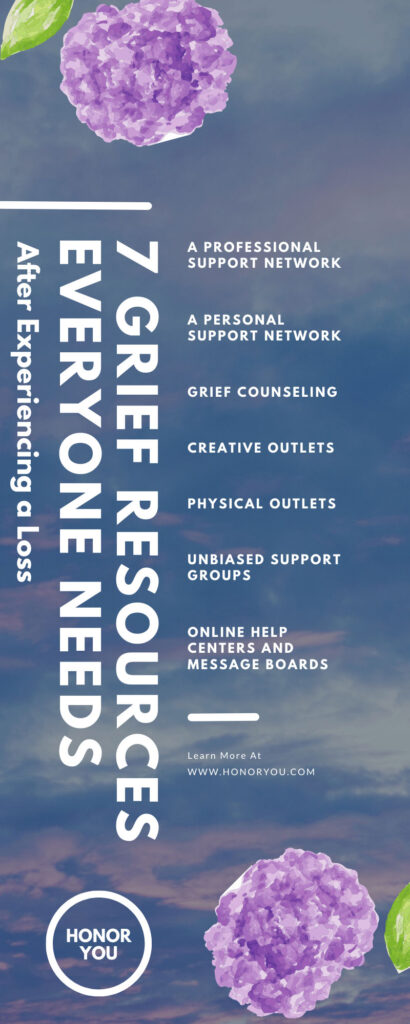7 Grief Resources Everyone Needs After Experiencing a Loss

How To Plan a Celebration of Life for Your Loved One
December 7, 2021
How To Preserve the Memory of a Lost Loved One
December 16, 2021Grief is a challenging process. Not only are you learning to live without your loved one, but you also have to navigate powerful emotions. For this reason, it’s so important to learn about all the different grief resources available to you. Moreover, it’s essential to understand which resources will help you heal. Delve into some of these options in this detailed guide.
A Professional Support Network
One grief resource that many tend to overlook is reaching out to your professional network for support when you need it. It might seem odd to think that your co-workers could offer you tools and resources that will help you work through your grief, but the truth is that the people you work with can make a tremendous impact on your ability to grieve healthily.
Think about it—you likely work forty hours a week for your job. That fact alone can be overwhelming when you’re dealing with the poignant emotions that come with great loss. And it’s completely natural to struggle with being efficient at work when you’re combatting such a significant emotional experience. If you don’t communicate this to your manager and co-workers, they won’t know.
Moreover, they won’t be able to help you through it. You don’t have to divulge all the personal details. But reaching out and letting your professional network know that you need help will enable them to take some of the weight off your shoulders until you’re feeling better.
A Personal Support Network
A strong personal support system is one of the most crucial grief resources everyone needs after experiencing a loss. If you’re unaware, these networks usually involve the people closest to you, such as your family, significant other, and close friends.
This resource is essential because those closest to you might have better insight into what you need to heal correctly. Just as well, the people in your network might lead you to other resources. For instance, perhaps your sister has experienced a tremendous loss herself. In this case, she might be able to point you in the direction of an excellent grief support group or counselor.
Grief Counseling
As well-intended as your loved ones can be, they won’t always know exactly how to help you. For this reason, it’s wise to find a grief counselor when you feel ready. Grief counselors can offer an unbiased listening ear.
Plus, they train for years to provide the healthiest tools and coping strategies to those struggling with loss. We understand that the idea of spilling your guts to a counselor might feel uncomfortable or even scary at first, but it’s one of the most effective ways to work through your emotions.
These counselors understand grief in a way that most others don’t and work with you to form a realistic game plan to help you move forward. Most importantly, grief counselors can help you navigate your grief so that you don’t have to face it alone.
Creative Outlets
Of course, part of grieving involves the overwhelming emotions that come with it. And as much as you might want to, holding them back or pushing them out isn’t always the healthiest way to manage your feelings. For this reason, having a resource that provides a creative channel for these emotions is crucial.
To illustrate, perhaps you’ve always wanted to learn how to cook. If so, taking a cooking class might be an excellent outlet. Or maybe you want to learn how to sculpt clay or write a novel. Finding a creative outlet for your grief can help you make sense of your emotions by creating something new. Plus, if you find yourself in a class setting, it can also be an excellent way to meet new people who share your interests and can offer support.
Physical Outlets
It’s also prudent to take advantage of resources that offer a physical outlet for your grief. Perhaps you decide you need to get out of the house a bit more. Going on a nightly walk can be an excellent way to clear your head and honor your physical health at the same time.
Or maybe you feel as though you could benefit from a team sport, such as volleyball. If this is the case, you can join a casual volleyball league and enjoy the company of others, even if it’s just occasionally. These types of outlets can be an excellent way to decompress and hone your focus on physical activity.
Unbiased Support Groups
Grief is a unique experience for everyone. Because your situation is so distinct, the people in your life won’t always know how to relate to it. And it’s not always helpful to speak to them about all the different facets of your grief. This can often exacerbate the magnitude of your emotions rather than help to process them. For this reason, unbiased support groups are most assuredly a grief resource everyone needs after experiencing a loss.
Numerous grief support groups offer a safe, anonymous space for you to talk openly about your experiences. And typically, all you have to do is show up and talk, which proves to be cathartic for many. Plus, discussing your struggle with people who are having similar experiences is always helpful. Not only do they understand where you’re coming from, but they also have a sharper insight into what might be beneficial to you.
Online Help Centers and Message Boards
Similarly, online help centers and grief message boards are excellent resources if you’re looking for someone to listen to and understand you. These are especially useful for those who want to reach out for help but are not fully prepared to brave the outside world yet.
Online help centers offer a lot of the same tools and resources as in-person groups. There are often people you can chat with directly. Plus, these centers provide referrals to other types of resources, such as grief counselors, other support groups, and even funeral homes if needed.
Grief message boards are another excellent resource for those who are looking to share their story. And the fantastic thing about these resources is that you can choose to be very involved, or you can take a back seat if it’s more comfortable for you. For instance, some people will leave long detailed messages that tell their entire story. They’ll even include pictures and memorial acknowledgment cards from their loved one’s funeral. However, some also find comfort in quietly reading through other people’s experiences. Doing this can help put your grief in perspective so that you can understand you’re not alone in your journey.
Grief is a strange and challenging emotional process. And because it can become overwhelming, it’s crucial for those dealing with a loss to have resources available that make them feel supported and strong. So, if you’re struggling with grief, understand that you don’t have to face it alone. There are options for you. And hopefully, we were able to point out some of them in this guide.



